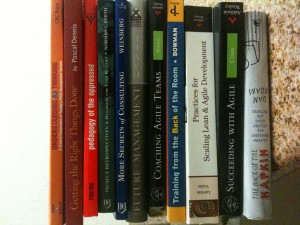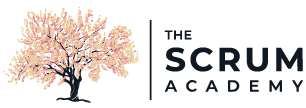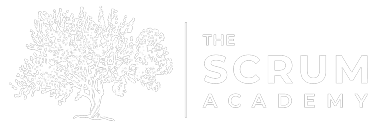Reading List (1st Half of 2010)
 Wow! I have read a LOT in the last six months! I guess that is one of the advantages of being on the road for about six months.
Wow! I have read a LOT in the last six months! I guess that is one of the advantages of being on the road for about six months.
- Understanding A3 Thinking – excellent description of how to use and create an A3: a Lean tool for executing Plan-Do-Check-Act (the Deming cycle). This is the definitive source on A3, Henrik Kniberg has an Agile example and template on his site.
- Getting the Right Things Done – good description of the concept of True North, developing strategy from True North and the respectful nature of Lean, the rest is kinda dull.
- Pedagogy of the Oppressed – unique perspective on the characteristics of oppression, the oppressed and the oppressors; liberation for both the oppressed and the oppressors originates when the oppressed become fully engaged in the human dialogue of being, not simply exchanging roles with the oppressors. Interesting connections to corporate life in the 21st century.
- Project Retrospectives – discussion on the importance of making a deep-dive examination of a software project when it finally is complete with detailed exercises and agenda. This is great book if you want to know more about retrospectives.
- More Secrets of Consulting – just brilliant! If you liked the first book, this one has so many practical gems for the consultant. The only tedious parts of this book are the references to his other books. My favorite tool: the Wishing Wand.
- The Future of Management – this book was a favorite of the CEO at my last client. There are many Scrum concepts in the case studies provided. Too bad that many of the principles of self-organization and empowerment supported by the executives never filtered down to the teams :(
- Coaching Agile Teams – WOW! This is an awesome book, deep and rich with many profound insights on the various roles of an Agile coach. In addition, Lyssa provides practical tools to improve both the coach and the individual. This is definitely a book to return to again and again.
- Training From the Back of the Room – this is my favorite book from the last six months since it has had the most impact on my personal performance. It has changed my perspective on how to train adults with its sound theory of education and myriad of exercises which bolster learning. Share this book with anyone who trains adults (thanks to “Agile Bob” Hartman for tweeting this book title!)
- Practices for Scaling Lean & Agile Development – comprehensive companion book to Scaling Lean & Agile Development (which is very good on Lean and Scrum). This book is full of good stuff, but just too long. Unless you are a guru (or wanna be), stick with the first book.
- Succeeding with Agile – Mike Cohn has put out another great book based on his years of practical experience with Scrum. This book is also pretty long, but not tedious. A great read if you have some experience with Scrum, but want to improve the overall experience, apply targeted improvements or figure out how to expand the reach of Scrum in your organization – it covers it all.
- The Back of the Napkin – provides a framework on how to apply visual thinking tools to explain and sell ideas. Since most of the work I do is conceptual, being able to draw a powerful picture is a useful skill. A nice addition to my consultant toolkit and I look forward to sharing it with others (I didn’t find the companion book that useful, so skip it).
- Hitchhiker’s Guide to the Galaxy series (not pictured) – these books were consistently entertaining, surreal and light; most were less than 200 pages. The pace slows down around book 3 (Life, the Universe and Everything), but delightful nonetheless. I cannot believe I just discovered them in my mid-30’s!
Believe it or not, there are a few books I did not get a chance to read. I guess these will have to wait until after vacation.
- Leading Out Loud – about finding your authentic voice in business. I bought this to get some ideas about leadership and self-organizing teams.
- Hope is Not a Strategy – I need to understand the sales process better and improve my ability to sell. This looked interesting.

